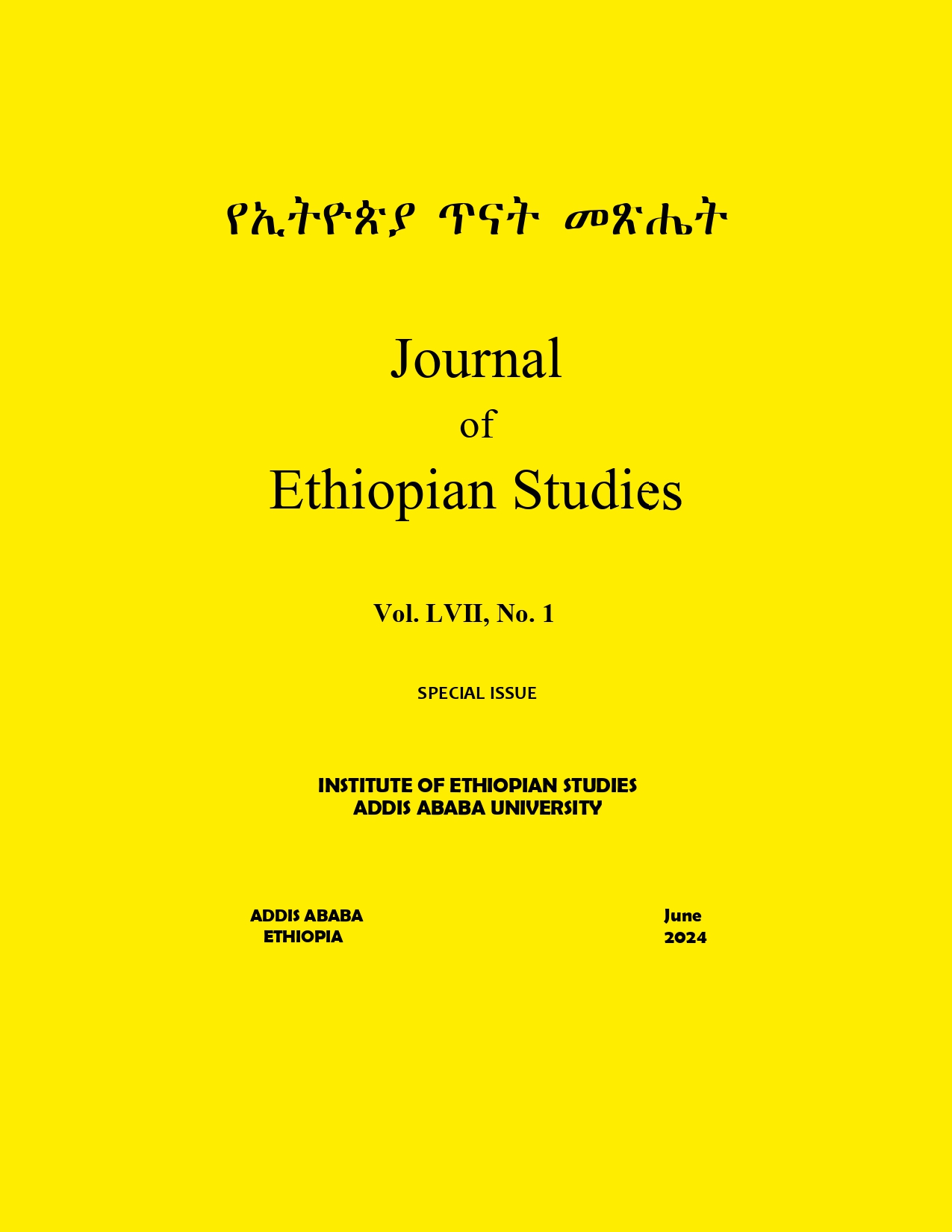የጋብቻ ለውጥ መለማመጃ ሥርዓተ ክዋኔዎች በጃቢ ጠህናን ማኅበረሰብ
Marriage Transformation Exercising Rituals in Jabi Tehinan District
Keywords:
ጋብቻ፣ ለውጥ፣ ሥርዓተ ክዋኔ፣ የሰርግ ዘፈኖች፣ ጃቢ ጠህናን, Marriage, Transformation, Ritual, Jabi Tehinan DistrictAbstract
ጋብቻ በባሕርይው ሰዎች ጠበቅ ያለ ለውጥ የሚያካሂዱበት የሕይወት ዘመን የደረጃ ሽግግር ማድረጊያ ከመሆኑ ጋር ተያይዞ፣ የተለያዩ ዓላማዎች ባሏቸውና ተከታታይ በሆኑ ሥርዓተ ክዋኔዎች ታጅቦ ይከበራል፡፡ ጋብቻ በጃቢ ጠህናን ወረዳ አሁንም ድረስ ከአስራ ስምንት ዓመት ዕድሜ የሚፈጸምባቸው ሁኔታዎች መኖራቸው ደግሞ ተጋቢዎች ላይ የሚደርሰውን ጫና ከባድና ውስብስብ ያደርገዋል፡፡ ሆኖም በወቅቱ በሚፈጸሙ ሥርዓተ ክዋኔዎች አማካኝነት ሽግግሩን አካሂደው፣ ለውጡን ተቀብለው የማኅበረሰቡ አካል ሲሆኑ ይስተዋላል፡፡ ይህን ከጋብቻ በፊትና በኋላ ያለውን ተቃርኖ
በማስማማትና ለውጡን በማላመድ የማኅበረሰቡ ህልውና ሚዛኑን ጠብቆ እንዲቀጥል ያስቻሉ ሥርዓተ ክዋኔዎችን የመረመረ ጥናት ባለመኖሩ ይህንን ጥናት ማካሄድ አስፈላጊ ሆኗል፡፡ የጥናቱ ዋና ዓላማ በጋብቻ ወቅት የሚፈጸሙሥርዓተ ክዋኔዎች ምን ምን እንደሆኑ መግለጽና ሚናቸው ምን እንደሚመስል ከጃቢ ጠህናን ወረዳ ማህበረሰብ ባህል፣ አኗኗር፣ ልማድና እምነት አንጻር ማሳየት ነው፡፡ በውስጡ ዋና ዋና የጋብቻ ሽግግር ሥርዓተ ክዋኔዎችን መግለጽ እና ለተጋቢዎች ለውጥም ሆነ ለማህበረሰቡ የሚያበረክቷቸውን ሚናዎች መተንተን የሚሉ ንዑሳን ዓላማዎችን ይዟል፡፡ ጥናቱ ዓይነታዊ ሲሆን መረጃዎች ከቀዳማይና ከካልአይ ምንጮች ተሰብስበዋል፡፡ ተሳትፏዊና ተሳትፏዊ ያልሆነ ምልከታ እንዲሁም ነጻ ቃለ መጠይቅ በመረጃ መሰብሰቢያነት የተጠቀመ ሲሆን መረጃው የተግባራውያንን የንድፈ ሐሳብ ፈለግ በመደገፍ ተተንትኗል፡፡ የመረጃ ትንተናው ውጤት እንደሚያሳየው በጋብቻ ወቅት ከሰርግ ዋዜማ እስከ ጫጉላ ግላጭ ድረስ ምሪ የመፍታት፣ የወንድ ሙሽራን የመፈተን እና ቃል የማስገባት እንዲሁም የዙረሽ ግቢ ክዋኔዎች በሙሽሪት ወላጆች ቤት የሚፈጸሙ ሲሆን፤ ሙሽሮችን የተለየ ምግብ መመገብ፣ የጫጉላ ቤት ጨዋታ እና የጫጉላ ግላጭ ሥነ ሥርዓቶች ደግሞ በወንዱ ሙሽራ ወላጆች ቤት የሚቀጥሉ መሆናቸውን አመላክቷል፡፡ ሥርዓተ ክዋኔዎችም ጋብቻውን የማጀብ ወይም የማድመቅ፣ ሕክምና የመስጠት (የመፈወስ)፣ ባለጉዳይን ከሽግግሩ ጋር የማስማማት እና ለውጡን የማወጅ (ማረጋገጥ) ባጠቃላይ የጋብቻ ለውጡን የማለማመድ ሚናዎች እንዳሏቸው ጥናቱ አመላክቷል፡፡
Marriage is a phase of life in which humans go through drastic changes, and it is celebrated with a continuum of rituals with different objectives. The fact that marriage still takes place below the age of eighteen in the Jabi Tehinan district makes the pressure on married couples difficult and complicated. However, it can be seen that they have made the transition, accepted the transformation, and become a part of the society through the processes that take place at the time. It is necessary to conduct this research because there is no research that has examined the rituals that allowed the existence of the community to maintain its balance by harmonizing the contradiction between before and after marriage and adapting to the change. The main purpose of the study is to explain what the rituals that take place during marriage are and to show what their role is like in terms of the culture, lifestyle, customs, and beliefs of the Jabi Tehinan district community. It has the specific objectives of describing the major processes of marriage transition and analyzing the roles they contribute to the transition of couples and to society. The study is qualitative, and the data used primary and secondary sources. The research data were collected through participant and non-participant observation and open-ended interview methods. The research also used the functionalism theoretical framework to analyze data. The results of the data analysis show that during the marriage period, from the eve of the wedding to the wedding ceremony and honeymoon, the activities of untying the bridegroom, testing the bridegroom and making promises, and the circumambulation are performed at the bride's parents' house. He pointed out that feeding the brides a different meal, the wedding house game, and the ending honeymoon ceremony will continue at the home of the groom's parents. Rituals can accompany or highlight the marriage, provide treatment (heal), adapt the couple to the transition, and announce (validate) the transformation.


